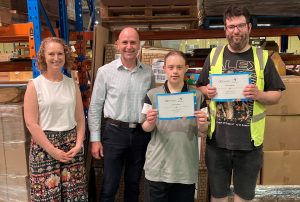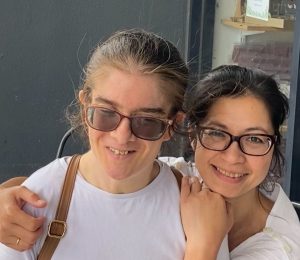Over the last few months, Day Support leaders and support staff have been trialling and testing new, innovative ways of teaching our Literacy and Numeracy programs. Due to varying communication and information processing needs, our education programs must be regularly adapted to suit the learning styles of many different participants.
SUpporting diverse learning
Our creative Day Support team work using a Co-Achieve model. This means the voices of our participants are heard and valued, and strategies to reach their personal goals are made in collaboration with them. It’s about choice and independence and it helps our staff to understand a participant’s hopes and needs.
Adaptive teaching is crucial for people living with disabilities – whether it be physical or cognitive support, creative strategies are often used to ensure that information is being heard, processed and retained. Our staff provide ongoing learning opportunities for adults with intellectual and developmental disabilities, both in and out of set sessions, by listening and working with them to understand their needs.
Everyone is different, so it can take some time to understand the learning styles of each participant and plan programs to ensure no one is left behind.
adapting our literacy and numeracy program
One of our programs, recently dubbed ‘Off the Page’, has incorporated a stronger visual approach to learning numeracy. Support worker Michelle swapped worksheets for tactile, real-life examples of counting, addition, and subtraction, including using a deck of playing cards to memorise numbers.
During an ‘Off the Page’ session, Michelle engages participants with a game of bingo, prompting their memories with visual cues and building a supportive group structure. Incorporating playing cards – something recognisable and fun – gets participants engaged on a deeper level. There’s a sense of comradery that helps information travel around the room, and the social aspects of learning allow participants to support each other and be creative in communication.
Many OC educators utilise the daily arrival of the Tasty Truck in their numeracy programs. With participants in line for the food truck, Michelle asks them how many people are waiting and helps them break down their purchase before reaching the server. Engaging learners in real-life situations and encounters is a great opportunity to show them why they’re learning specific things and when this information will be used.
This is only one example of adaptive teaching within OC Connections’ educational programs – we’re excited to share stories and ideas from our creative and skill-based classes over the next few months.
From Dance & Movement to Literacy to IT skill-building, our innovative educators and support staff explore creative ways to engage participants and support them to learn important life skills.





